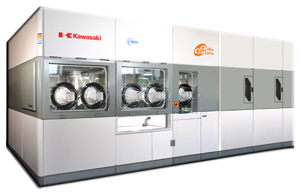Cells Cultured by Automation Are Used for a World-first Clinical Study in Thailand
Dec. 27, 2016
Tokyo, December 27, 2016 — Kawasaki Heavy Industries, Ltd. announced that today the Faculty of Medicine, Chulalongkorn University (MDCU) in Thailand performed a cell therapy of knee cartilage using mesenchymal stem cells cultured by AUTO CULTURE*1, an automated cell processing system developed by Kawasaki. Kawasaki and MDCU have been collaborating in a joint research project to automate the process of culturing mesenchymal stem cells using AUTO CULTURE. This is the world’s first clinical study using cells cultured by robot automation.
Kawasaki participated in a regenerative and cell medicine project jointly promoted by the New Energy and Industrial Technology Development Organization (NEDO) in Japan and the Ministry of Commerce of Thailand (2011-2013)*2 and has installed AUTO CULTURE at MDCU. Under a collaborative research agreement, Kawasaki and MDCU have been conducting demonstration experiments aimed at automated culturing of human cells and their use in actual therapy. Today MDCU performed a cell therapy based on the "articular cartilage deficiency restoration method using autologous mesenchymal stem cells" developed by Dr. Shigeyuki Wakitani, a professor of Mukogawa Women's University in Japan. MDCU will continue the clinical study using cells cultured by AUTO CULTURE, with the aim of raising the level of medical technology and welfare in Thailand through the verification of therapeutic results.
AUTO CULTURE has succeeded in automating the process of culturing high-quality cells using advanced robotics technologies. In clinical applications of regenerative medicine, cells are collected from the patient, increased by culturing, processed as necessary, then transplanted to the affected area. Since cell culturing and processing facilities (CPFs) where cells for clinical application are cultured assume that the culturing will be done manually, the processing rooms must be maintained at a very high clean level, and highly skilled culturing technicians are required. These requirements make it extremely expensive to construct and maintain CPFs, with the added burden of having to train technicians. These obstacles are impeding the widespread use of regenerative medicine. AUTO CULTURE resolves these issues through robotic culturing inside a system maintained at an extremely high level of cleanliness, thus contributing to the safe and low-cost clinical application of regenerative medicine.
Based on technologies cultivated through this project in Thailand, Kawasaki is currently developing a more efficient version of AUTO CULTURE, which is scheduled to be launched in a few years.
Kawasaki will contribute to the development and spread of regenerative medicine by applying its automation and production engineering technologies in robotics and other areas.
*1 AUTO CULTURE: Registered trademark of Kawasaki
*2 Regenerative and cell medicine project:
An international research, development, and demonstration project in environmental and medical fields; international research and development on advanced medical equipment systems and their demonstration; and research and development on regenerative and cell medicine technologies and optimization of manufacturing infrastructures
| Specifications of AUTO CULTURE | |
|---|---|
| Target cells | Adhesive cells |
| Culturing vessels | T175 flask, T500 flask |
Dimensions (W × D × H) |
6.4 × 1.65 × 2.4 m (for a 4-incubator configuration) |
| Installation environment | Clean level 100,000 (system interior: clean level 100) |
| Decontamination method | Automated decontamination by vaporized hydrogen peroxide |

Contact
If you need more information about our business,
please feel free to contact us.





